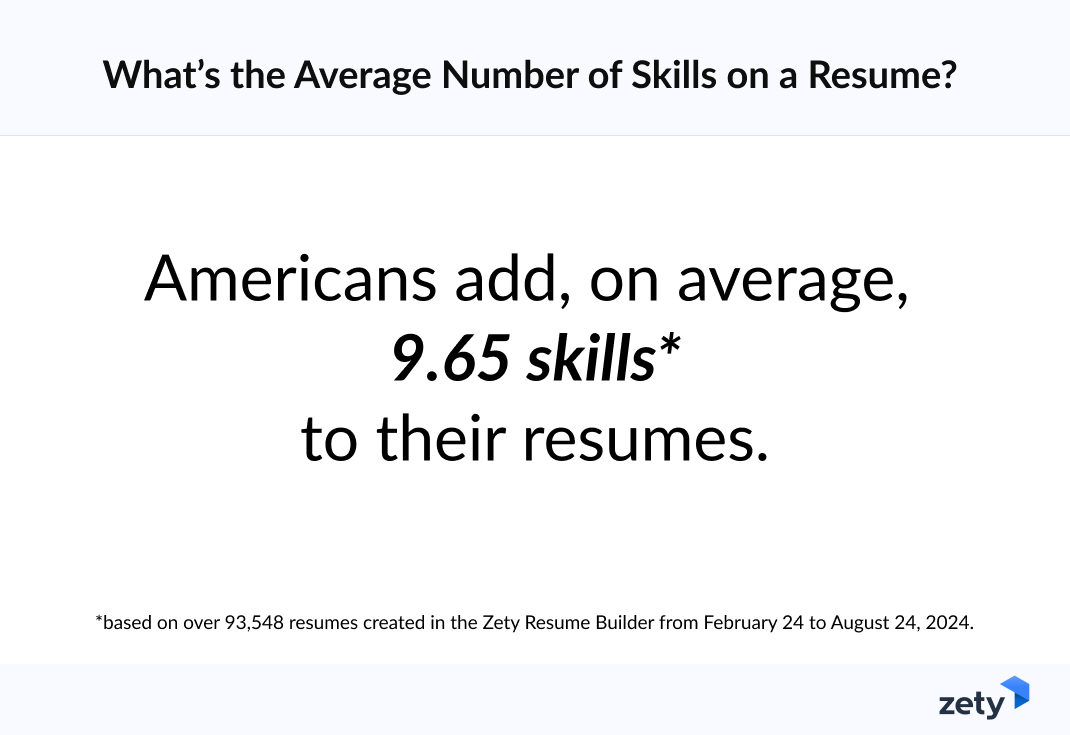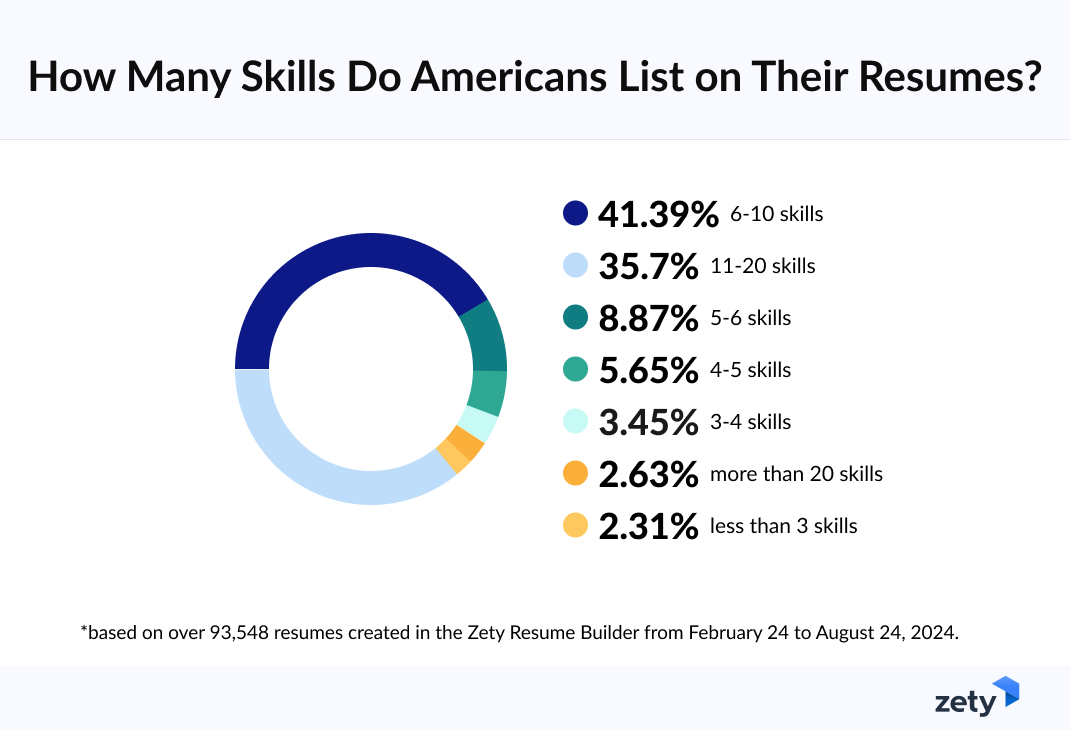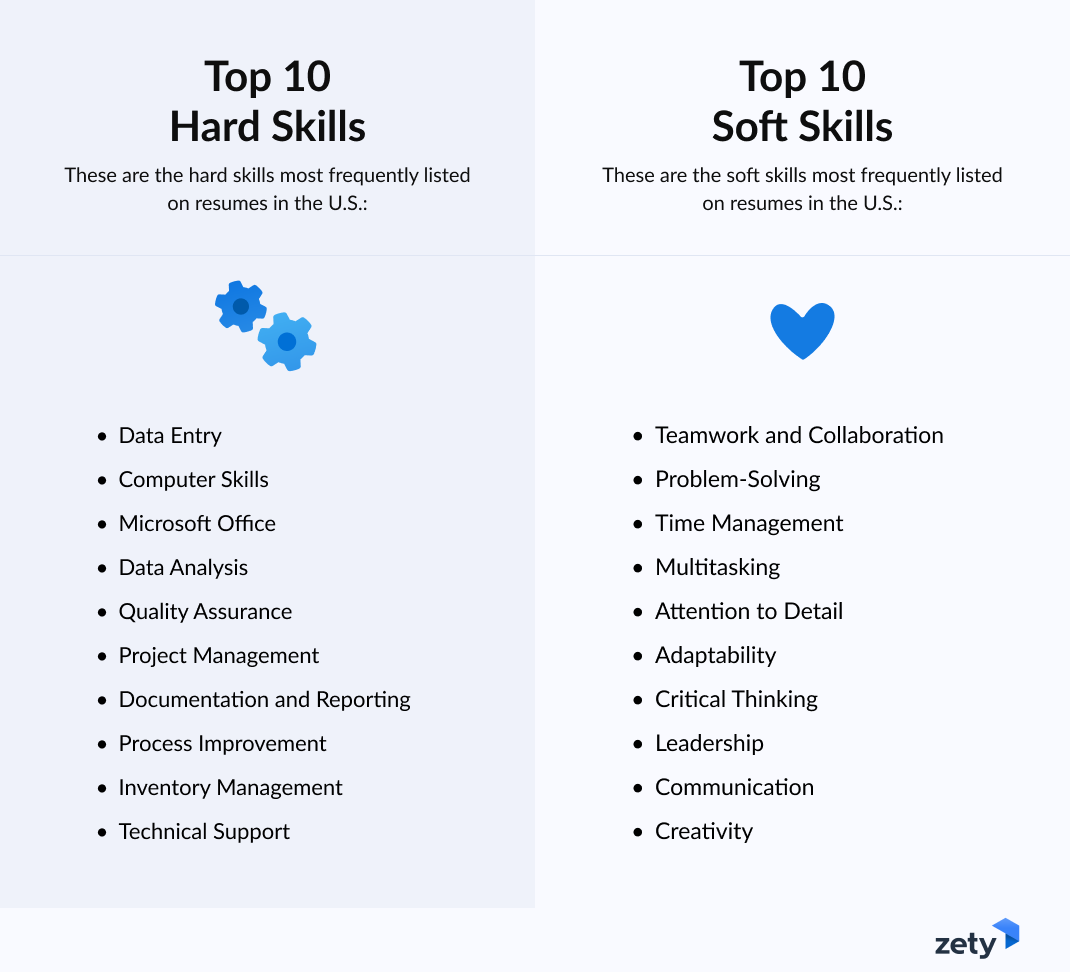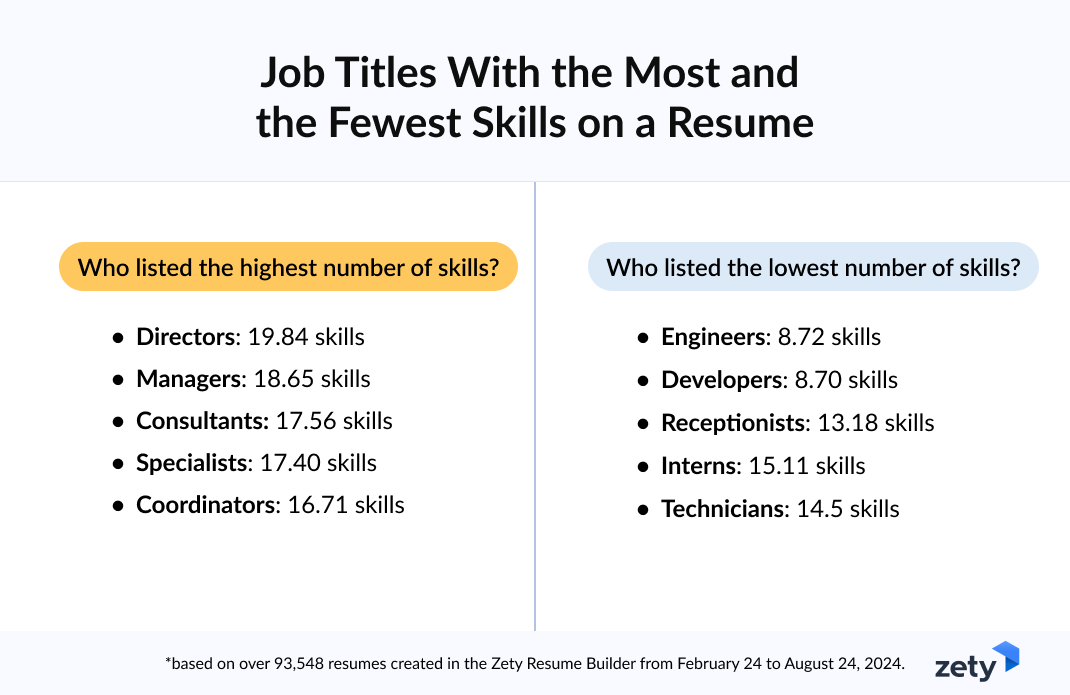The Most Popular Resume Skills: A 2024 Zety US Study
Create Your Resume NowThe skills section of your resume is one of the most important parts of your entire job application. It shows the recruiters that you have the qualifications they’re looking for. Knowing how to put skills on your resume is an invaluable skill that will help you propel your career forward.
To learn more about skills on a resume, I analyzed over 93 thousand resumes created in our builder by professionals holding over 2,500 different job titles. And I’m about to tell you what the data showed me.
What’s the Average Number of Skills on a Resume?
According to our updated data, American resumes list an average of 9.65 skills. The median number of skills on a resume in the U.S. is 8.81, slightly lower than the average, indicating that a few resumes with a significantly higher number of skills pull the average up.
The distribution shows that most resumes include between 6 and 20 skills, reflecting a balanced approach in which job seekers aim to showcase the depth and breadth of their qualifications.

Here’s a detailed breakdown:
- 2.31% of resumes listed fewer than 3 skills.
- 3.45% of resumes featured between 3 and 4 skills.
- 5.65% of resumes listed between 4 and 5 skills.
- 8.87% of resumes contained between 5 and 6skills.
- 41.39% of resumes included between 6 and 10 skills.
- 35.70% of resumes listed between11 and 20skills.
- 2.63% of resumes featured more than 20 skills.

These statistics indicate a general trend towards emphasizing a moderate number of well-rounded skills on a resume rather than an extensive list to better highlight key qualifications relevant to potential employers.
In comparison to other countries, American resumes tend to list more skills. For instance, resumes in countries like Germany and Brazil typically feature fewer skills, with an average closer to 5 skills per resume. This suggests that American candidates may feel a stronger need to highlight a diverse range of competencies to meet the expectations of US employers.
The Most Popular Resume Skills in the US
How many skills should you list on your resume—and which ones? There's no one-size-fits-all answer. The number and type of skills depend on the job requirements and the candidate's experience. For example, a medical student will need different skills than a CEO. However, it's generally advisable to list more than just a couple of skills.
But which skills are most commonly listed on resumes in the United States? Let’s take a look at the data from our users:
- Teamwork and collaboration was listed 6,183 times as a key skill.
- Problem-solving was mentioned 5,917 times.
- Time management was highlighted 5,524 times as an important competency.
- Multitasking was included 4,674 times in the resumes.
- Customer service was cited 4,109 times, emphasizing its importance in client-facing roles.
- Attention to detail was cited 3,878 times.
- Adaptability was identified 3,417 times as a valuable skill.
- Decision-making was listed 4,237 times, underscoring its importance in many roles.
- Organizational skills were noted 3,717 times, reflecting their necessity for managing tasks efficiently.
- Analytical thinking was mentioned 3,451 times, highlighting its value in data-driven environments.
Clearly, soft skills like teamwork, problem-solving, and time management are highly valued. This reflects the current demand for a connected, global workforce, where employers need employees who can communicate effectively and work well in teams.
If you ever doubted the importance of soft skills on a resume, our data proves that soft skills are crucial for a well-rounded resume that demonstrates your people skills and ability to work efficiently and effectively in remote and hybrid environments. No wonder that the most essential soft skills are increasingly called power skills, which highlights their indispensability.
Remember that although our study can give you some valuable insights into the current landscape of professional skills, you should always customize your resume to a particular job offer you’re targeting. Maciej Tomaszewicz, one of the top career experts, agrees:
When listing skills on your resume, it's important to focus on those that are directly relevant to the job you’re applying for instead of relying on the most common skills in general. Tailoring your skills to the specific job description can greatly increase your chances of getting noticed by employers.
Industry-Specific Resume Skills Trends
Let’s see which skills are the most common in specific industries. I’ve picked some of the ones that most American employees work in, according to the US Bureau of Labor Statistics.
Healthcare and Social Assistance
Based on our data analysis, professionals in the healthcare and social assistance sector, which is one of the largest employers in the U.S., consistently highlight patient care as the most commonly listed skill on resumes. Communication skills are also frequently mentioned, underscoring the importance of effective interaction with patients, families, and healthcare teams. Additionally, adaptability ranks high, indicating the need for healthcare professionals to respond quickly to changing patient needs and evolving healthcare regulations.
Retail Trade
Our data shows that in the retail trade sector, despite the growing presence of online shopping, customer service remains the top skill listed on resumes. Sales techniques are another popular skill, reflecting the importance of driving revenue and meeting sales targets. Furthermore, organization is frequently highlighted, essential for tasks like managing inventory, arranging displays, and maintaining store orderliness.
Professional and Business Services
Our analysis reveals that analyticalskills are among the most frequently mentioned by job seekers in the diverse professional and business services sector. This is particularly important in fields like consulting and engineering, where data-driven decision-making is critical. Project management is also a popular skill, reflecting the need to oversee complex projects and meet deadlines. Additionally, interpersonal skills are commonly listed, emphasizing the importance of client interactions, teamwork, and leadership within this sector.
Manufacturing
According to our data, technical skills remain the most frequently listed on resumes in this sector. This underscores the need for knowledge of machinery and production processes. Attention to detail is another key skill, particularly in roles involving precision work, such as assembling electronics or producing automotive parts. Problem-solving abilities are also highly ranked, which is essential for addressing production issues and ensuring quality control in manufacturing.
The Most Popular Hard and Soft Skills
So, which skills most frequently appear on resumes in the United States? To answer this question, I’ve analyzed the data and categorized the skills into soft and hard skills. Here are my findings:

Top 10 Soft Skills on Resumes
Soft skills are defined as abilities and attributes that are not directly related to a job's specific tasks but enable effective self-management, efficient use of work time, and collaboration with others in the workplace.
Here is a list of the 10 most popular soft skills that we recorded from resumes created using our builder:
- Teamwork and Collaboration
- Problem-Solving
- Time Management
- Multitasking
- Attention to Detail
- Adaptability
- Critical Thinking
- Leadership
- Communication
- Creativity
It's worth noting that researchers have long emphasized the importance of soft skills in the job search process. For instance, Patrick C. Kyllonen, in his 2013 article, highlighted that skills such as motivation, work ethic, teamwork, organization, cultural awareness, and effective communication play as crucial a role—if not more so—in achieving career success as hard skills.
What's more, soft skills can also be a key advantage for candidates in the face of increasing automation in the workplace—since no machine possesses these abilities.
Top 10 Hard Skills on Resumes
Hard skills refer to the knowledge and abilities directly related to the job tasks that an employee is expected to perform. These are specialized qualifications acquired through education, training, and professional experience.
Here are the 10 most popular hard skills among our users:
- Data Entry
- Computer Skills
- Microsoft Office
- Data Analysis
- Quality Assurance
- Project Management
- Documentation and Reporting
- Process Improvement
- Inventory Management
- Technical Support
Interestingly, most of these hard skills are quite universal and do not point to a specific occupation.
Job Titles With the Most and the Fewest Skills on a Resume
To examine how professionals across various fields are highlighting their skill sets, I’ve focused on general job titles that span multiple industries. Here’s what I’ve discovered.

General Job Titles with the Most Skills Added
Among the most common job titles, the following roles have the highest average number of skills added to resumes:
- Director: On average, individuals with the title of Director added 19.84 skills to their resumes. This reflects the extensive and varied skill set required for senior leadership roles.
- Manager: Managers added an average of 18.65 skills. This number reflects the diverse and multifaceted nature of management roles, which require proficiency in areas such as team leadership, project management, operational efficiency, and communication.
- Consultant: Consultants reported adding 17.56 skills on average. Given the varied nature of consulting work, which often spans multiple industries and requires specialized knowledge, consultants continuously acquire new skills to meet their clients' demands and stay competitive in the market.
- Specialist: Individuals in Specialist roles added around 17.40 skills on average. Specialists, who often possess deep expertise in a particular area, may add skills related to emerging trends, new technologies, or advanced methodologies within their field.
- Coordinator: Coordinators added an average of 16.71 skills. These professionals are responsible for organizing and managing various aspects of projects or events, requiring a broad skill set that can include project management, communication, logistics, and time management.
I believe these findings suggest that roles involving leadership, strategic oversight, and specialized expertise demand a broad and continuously evolving skill set, leading to a higher number of skills added to resumes.
General Job Titles with the Least Skills Added
In contrast, the following general job titles are associated with a lower average number of skills added to resumes:
- Engineer: Engineers added an average of 8.72 skills. This relatively lower number of skills added may reflect the specialized nature of engineering roles, where deep expertise in a specific technical area is often more critical than acquiring a broad range of new skills.
- Developer: Developers reported adding an average of 8.7 skills. While technology evolves rapidly, developers may focus on mastering specific programming languages or tools rather than expanding into a wide array of new skills.
- Receptionist: Receptionists added an average of 13.18 skills. This role, which often involves administrative and customer service tasks, may not require as frequent an update to the skill set, leading to fewer new skills being added.
- Intern: On average, interns added 15.11 skills. As entry-level professionals, interns are typically focused on learning the basics and gaining initial experience, which may limit the scope of new skills added during their internship period.
- Technician: Technicians reported adding 14.50 skills on average. These roles often require specialized technical knowledge, which can be stable over time, leading to fewer new skills being added unless there are significant technological advancements.
These roles typically involve specialized tasks or are at the entry-level, where the focus is on mastering a core set of skills.
Summary
Here’s a quick summary of our most interesting findings:
- According to our study, Americans list, on average, 9.65 skills on their resumes, with a median number of skills at 8.81.
- The majority of resumes (41.39%) included between 6 to 10 skills, while a substantial portion (35.70%) listed between 11 to 20 skills.
- Teamwork and collaboration, problem-solving, and multitasking were the most often listed on resumes.
- All of the top 10 most frequently listed skills were soft skills, indicating that they’re an essential element of every resume.
Methodology
The results of this study are based on the analysis of real professional resumes written by users of the Zety resume builder—people of different ages from different locations, industries, and career stages. The resumes were created by professionals holding more than 2,500 different job titles. The analyzed documents were created from February 24, 2024, to August 24, 2024.
Fair Use Statement
Don't miss the chance to share these results—you might regret it! If you think this information will be of interest to your audience, feel free to share it for non-commercial purposes. In return, we ask that you link to this page so your readers can see the entire study.
About Zety’s Editorial Process
This article has been reviewed by our editorial team to make sure it follows Zety's editorial guidelines. We’re committed to sharing our expertise and giving you trustworthy career advice tailored to your needs. High-quality content is what brings over 40 million readers to our site every year. But we don't stop there. Our team conducts original research to understand the job market better, and we pride ourselves on being quoted by top universities and prime media outlets from around the world.



